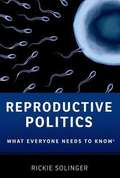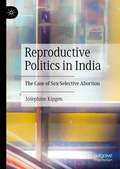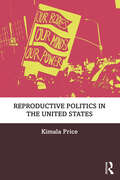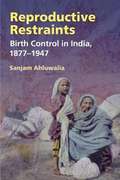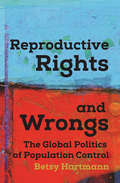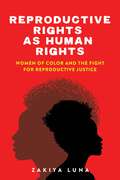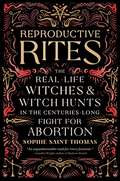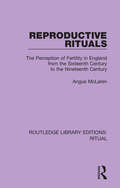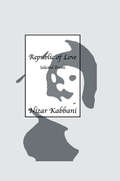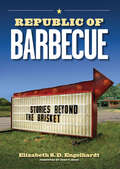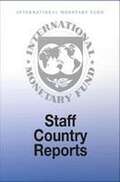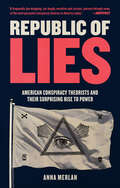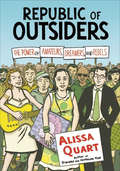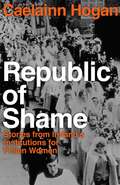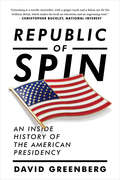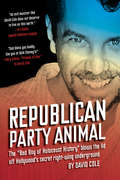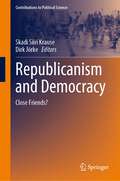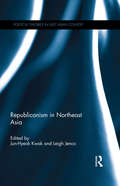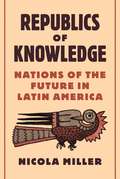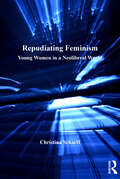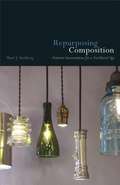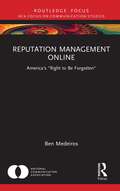- Table View
- List View
Reproductive Politics (What Everyone Needs To Know Ser.)
by Rickie SolingerThe term "reproductive politics" was coined by feminists in the 1970s to describe contemporary Roe v. Wade-era power struggles over contraception and abortion, adoption and surrogacy, and other satellite issues. Forty years later, questions about reproductive rights are just as complex--and controversial--as they were then. Focusing mainly on the United States, Reproductive Politics: What Everyone Needs to Know® explores the legal, political, religious, social, ethical, and medical dimensions of this hotly contested arena. <P><P> Tracing the historical roots of reproductive politics up through the present, Rickie Solinger considers a range of topics from abortion and contraception to health care reform and assisted reproductive technologies. Solinger tackles some of the most contentious questions up for debate today, including the definition of "fetal personhood," and the roles poverty and welfare policy play in shaping reproductive rights. The answers she provides are informative, balanced, and sometimes quite surprising. <P><P> Offering a wide range of information in an accessible and engaging manner, Reproductive Politics: What Everyone Needs to Know® orients readers and provides the knowledge necessary to follow the debates in this important and continually evolving field. <P><P> What Everyone Needs to Know® is a registered trademark of Oxford University Press.
Reproductive Politics in India: The Case of Sex-Selective Abortion
by Josephine KipgenThis monograph explores the full context of sex-selective abortion (SSA) in India by examining the historical forces, political movements, government policies, and gender regimes that shape this reproductive practice. Using qualitative research methods within a feminist methodology, including in-depth interviews with service providers and professionals in New Delhi and a content analysis of Indian newspapers, the study engages the following areas of analysis: the social structures and determinants of SSA in India, the potential for women’s agency in SSA, and the representations of SSA and SSA-seeking women in the Indian media. This research expands the discourse and analysis of SSA by facilitating a nuanced and multilayered exploration of a profoundly contextual, personal, and gendered reproductive issue by grounding data and interpretation in the lived experiences of research participants with systems-wide knowledge of SSA. Further, the feminist theory-informed analysis moves away from normative victimhood frameworks. Lastly, the book contributes to the understudied area of media discourse analysis on the intersections of gender and SSA in national news coverage. This book will be relevant for students, scholars, and teachers across the humanities and social sciences interested in reproductive rights, justice, and feminist research methods. It will also be a critical resource for sexual and reproductive health and rights (SRHR) advocates.
Reproductive Politics in the United States
by Kimala PriceReproductive Politics in the United States is a concise, accessible, and engaging introduction to what continues to be a contentious and polarizing topic in the United States. Focusing on the current debates, controversies, and realities of reproductive justice, this text seeks to examine the historical, social and cultural forces that shape those politics. Making use of an explicitly feminist framework, the book analyzes how the intersections of gender, race, ethnicity, class, sexuality, and other markers of difference are implicated in protest and policy. This is a primer for Women’s and Gender Studies students, and for those coming to the topic for the first time.
Reproductive Restraints: Birth Control in India, 1877-1947
by Sanjam AhluwaliaReproductive Restraints traces the history of contraception use and population management in colonial India, while illuminating its connection to contemporary debates in India and birth control movements in Great Britain and the United States. Sanjam Ahluwalia draws attention to the interactive and relational history of Indian birth control by including western activists such as Margaret Sanger and Marie Stopes alongside important Indian campaigners. In revealing the elitist politics of middle-class feminists, Indian nationalists, western activists, colonial authorities and the medical establishment, Ahluwalia finds that they all sought to rationalize procreation and regulate women while invoking competing notions of freedom, femininity, and family. Ahluwalia's remarkable interviews with practicing midwives in rural northern India fills a gaping void in the documentary history of birth control and shows that the movement has had little appeal to non-elite groups in India. Finding that Jaunpuri women's reproductive decisions are bound to their emotional, cultural, and economic reliance on family and community, Ahluwalia presents the limitations of universal liberal feminist categories, which often do not consider differences among localized subjects. She argues that elitist birth control efforts failed to account for Indian women's values and needs and have worked to restrict reproductive rights rather than liberate subaltern Indian women since colonial times.
Reproductive Rights and Wrongs: The Global Politics of Population Control (Third Edition) (Women's Studies)
by Betsy HartmannWith a new prologue by the author, this feminist classic is an important gateway into the controversial topic of population for students, activists, researchers and policymakers. It challenges the myth of overpopulation, uncovering the deeper roots of poverty, environmental degradation and gender inequalities. With vivid case studies, it explores how population control programs came to be promoted by powerful governments, foundations and international agencies as an instrument of Cold War development and security policy. Mainly targeting poor women, these programs were designed to drive down birth rates as rapidly and cheaply as possible, with coercion often a matter of course. In the war on population growth, birth control was deployed as a weapon, rather than as a tool of reproductive choice. <p><p> Threaded throughout Reproductive Rights and Wrongs is the story of how international women’s health activists fought to reform population control and promote a new agenda of sexual and reproductive health and rights for all people. While their efforts bore fruit, many obstacles remain. On one side is the anti-choice movement that wants to deny women access not only to abortion, but to most methods of contraception. On the other is a resurgent, well-funded population control lobby that often obscures its motives with the language of women’s empowerment. Despite declining birth rates worldwide - average global family size is now 2.5 children - overpopulation alarm is on the rise, tied now to the threats of climate change and terrorism. <p> Reproductive Rights and Wrongs helps readers understand how these contemporary developments are rooted in the longer history and politics of population control. In the pages of this book a new generation of readers will find knowledge, argumentation and inspiration that will help in ongoing struggles to achieve reproductive rights and social, environmental and gender justice.
Reproductive Rights as Human Rights: Women of Color and the Fight for Reproductive Justice
by Zakiya LunaReveals both the promise and the pitfalls associated with a human rights approach to the women of color-focused reproductive rights activism of SisterSongHow did reproductive justice—defined as the right to have children, to not have children, and to parent—become recognized as a human rights issue? In Reproductive Rights as Human Rights, Zakiya Luna highlights the often-forgotten activism of women of color who are largely responsible for creating what we now know as the modern-day reproductive justice movement.Focusing on SisterSong, an intersectional reproductive justice organization, Luna shows how, and why, women of color mobilized around reproductive rights in the domestic arena. She examines their key role in re-framing reproductive rights as human rights, raising this set of issues as a priority in the United States, a country hostile to the concept of human rights at home.An indispensable read, Reproductive Rights as Human Rights provides a much-needed intersectional perspective on the modern-day reproductive justice movement.
Reproductive Rites: The Real-Life Witches and Witch Hunts in the Centuries-Long Fight for Abortion
by Sophie Saint ThomasA provocative pop history that explores the witches—and witch hunts—in the untold story of abortion, from the days of Socrates through the Salem Witch Trials and the 1980s Satanic Panic, all the way to our fraught present. &“Not only fascinating and engaging but, in our current post-Roe climate, necessary . . . with wit, humor, and verve that make it an unputdownable read for every feminist.&” —Jennifer Wright, author of Madame Restell: The Life, Death, and Resurrection of Old New York&’s Most Fabulous, Fearless, and Infamous Abortionist For millennia, across cultures and continents, both providers and recipients of reproductive healthcare and abortions have been persecuted as witches (whether they actually practiced the craft or not). In this dauntless reassessment of that history, journalist Sophie Saint Thomas follows the tangled threads of witches and reproductive rights through the ages. Along the way, she maintains an intersectional eye toward the communities most affected by reproductive oppression (including Native Americans, enslaved Black women, and trans people) and offers a scathing look at the hypocrisy of anti-choice crusaders (from eugenicists in the Church of Satan to an astrology-following Republican First Lady). With heart, humor, and deeply researched insights, Reproductive Rites brings new context to the urgency of our ongoing fight.
Reproductive Rituals: The Perception of Fertility in England from the Sixteenth Century to the Nineteenth Century (Routledge Library Editions: Ritual #4)
by Angus McLarenOriginally published in 1984 Reproductive Ritual examines fertility and re-production in pre-industrial England. The book discusses both through anthropological research and reviews of contemporary literature that conscious family limitation was practised before the nineteenth century. The volume describes a surprising number of rules, regulations, taboos, injunctions, charms and herbal remedies used to affect pregnancy, and shows the extent to which individual women and men were concerned with controlling the size of their families. The fertility levels in England – as in Western Europe as a whole – were a very long way from the biological maximum in these centuries, and the book discusses the various reasons why this was so. The book reviews traditional ideas concerning the relationship between procreation and pleasure, drawn from a range of contemporary sources and discusses ways in which earlier generations sought both to promote and limit fertility. The book also examines abortion and shows how much evidence there is for its actual practice during the period and of traditional views towards it. This book provides a detailed understanding of historical attitudes towards conception family planning in pre-industrial England.
Republic Of Love
by NizarFirst published in 2005. Routledge is an imprint of Taylor & Francis, an informa company.
Republic of Barbecue: Stories Beyond the Brisket (Bridwell Texas History Series)
by Elizabeth S. D. EngelhardtIt's no overstatement to say that the state of Texas is a republic of barbecue. Whether it's brisket, sausage, ribs, or chicken, barbecue feeds friends while they catch up, soothes tensions at political events, fuels community festivals, sustains workers of all classes, celebrates brides and grooms, and even supports churches. Recognizing just how central barbecue is to Texas's cultural life, Elizabeth Engelhardt and a team of eleven graduate students from the University of Texas at Austin set out to discover and describe what barbecue has meant to Texans ever since they first smoked a beef brisket. Republic of Barbecue presents a fascinating, multifaceted portrait of the world of barbecue in Central Texas. The authors look at everything from legendary barbecue joints in places such as Taylor and Lockhart to feedlots, ultra-modern sausage factories, and sustainable forests growing hardwoods for barbecue pits. They talk to pit masters and proprietors, who share the secrets of barbecue in their own words. Like side dishes to the first-person stories, short essays by the authors explore a myriad of barbecue's themes-food history, manliness and meat, technology, nostalgia, civil rights, small-town Texas identity, barbecue's connection to music, favorite drinks such as Big Red, Dr. Pepper, Shiner Bock, and Lone Star beer-to mention only a few. An ode to Texas barbecue in films, a celebration of sports and barbecue, and a pie chart of the desserts that accompany brisket all find homes in the sidebars of the book, while photographic portraits of people and places bring readers face-to-face with the culture of barbecue.
Republic of Barbecue: Stories Beyond the Brisket (Bridwell Texas History Series)
by S. D. EngelhardtExplore the world of barbecue as food and culture through first-person stories from pit masters, barbecue joint owners, sausage makers, and wood suppliers.It’s no overstatement to say that the state of Texas is a republic of barbecue. Whether it’s brisket, sausage, ribs, or chicken, barbecue feeds friends while they catch up, soothes tensions at political events, fuels community festivals, sustains workers of all classes, celebrates brides and grooms, and even supports churches. Recognizing just how central barbecue is to Texas’s cultural life, Elizabeth Engelhardt and a team of eleven graduate students from the University of Texas at Austin set out to discover and describe what barbecue has meant to Texans ever since they first smoked a beef brisket.Republic of Barbecue presents a fascinating, multifaceted portrait of the world of barbecue in Central Texas. The authors look at everything from legendary barbecue joints in places such as Taylor and Lockhart to feedlots, ultra-modern sausage factories, and sustainable forests growing hardwoods for barbecue pits. They talk to pit masters and proprietors, who share the secrets of barbecue in their own words. Like side dishes to the first-person stories, short essays by the authors explore a myriad of barbecue’s themes—food history, manliness and meat, technology, nostalgia, civil rights, small-town Texas identity, barbecue’s connection to music, favorite drinks such as Big Red, Dr. Pepper, Shiner Bock, and Lone Star beer—to mention only a few. An ode to Texas barbecue in films, a celebration of sports and barbecue, and a pie chart of the desserts that accompany brisket all find homes in the sidebars of the book, while photographic portraits of people and places bring readers face-to-face with the culture of barbecue.“This beautiful collection, colorful enough to display as a coffee-table book, contributes significantly to the oral history tradition and the study of barbecue simultaneously.” —Journal of American Folklore“Tar Heels probably shouldn’t own up to liking Texas barbecue, but we have no hesitation about saying that we love this book about it. The voices of the folks who make it happen and this book’s wonderful photographs add up to a splendid portrait of Lone Star barbeculture.” —John Shelton Reed and Dale Volberg Reed, authors of Holy Smoke: The Big Book of North CarolinaBarbecue
Republic of Equatorial Guinea: Statistical Appendix
by International Monetary FundA report from the International Monetary Fund.
Republic of Lies: American Conspiracy Theorists and Their Surprising Rise to Power
by Anna Merlan“[An] engrossing assessment of the profitable mainstreaming of conspiracy mongering in civic and political life . . . A lucid look at a slippery topic.” —Kirkus ReviewsAmerican society has always been fertile ground for conspiracy theories, but with the election of Donald Trump, previously outlandish ideas suddenly attained legitimacy. Trump himself is a conspiracy enthusiast: From his claim that global warming is a Chinese hoax to the accusations of “fake news,” he has fanned the flames of suspicion.But it was not one man alone who gave these ideas increased power. Republic of Lies looks beyond the caricatures of conspiracy theorists to explain their tenacity. Without lending the theories validity, Anna Merlan gives a nuanced, sympathetic account of the people behind them, across the political spectrum, and the circumstances that helped them take hold. The lack of a social safety net, inadequate education, bitter culture wars, and years of economic insecurity have created large groups of people who feel forgotten by their government and even besieged by it. Our contemporary conditions are a perfect petri dish for conspiracy movements: a durable, permanent, elastic climate of alienation and resentment. All the while, an army of politicians and media figures have peddled fear to serve their own ends.Bringing together penetrating historical analysis and gripping on-the-ground reporting, Republic of Lies transforms our understanding of American paranoia.“A captivating book that illuminates the landscape of conspiracy theories and what they might say about society as a whole.” —New York Magazine
Republic of Moldova: Poverty Reduction Strategy Annual Evaluation Report 2005
by International Monetary FundA report from the International Monetary Fund.
Republic of Mozambique: Poverty Reduction Strategy Paper Progress Report (Review of the Economic and Social Plan for #2003)
by International Monetary FundA report from the International Monetary Fund.
Republic of Outsiders: The Power of Amateurs, Dreamers, and Rebels
by Alissa Quart&“Vivid portraits&” of individuals and subcultures by a writer who &“unmasks the assumptions we make about what counts as normal&” (The New York Times). They are outsiders who seek to redefine fields from mental health to diplomacy to music. They push boundaries and transform ideas. They include filmmakers crowdsourcing their work, transgender and autistic activists, and Occupy Wall Street&’s &“alternative bankers.&” These people create and package themselves in a practice cultural critic Alissa Quart dubs &“identity innovation.&” In this &“fascinating&” book, Quart introduces us to individuals who have created new structures to keep themselves sane, fulfilled, and, on occasion, paid. This deeply reported book shows how these groups now gather, organize, and create new communities and economies. Without a middleman, freed of established media, and highly mobile, unusual ideas and cultures are able to spread more quickly and find audiences and allies. Republic of Outsiders is a critical examination of those for whom being rebellious, marginal, or amateur is a source of strength (Barbara Ehrenreich). &“Even if you don&’t consider yourself an outsider or a rebel, Quart&’s book has several lessons for creative work, particularly when it comes to making art outside a heavily commercial system.&” —Fast Company &“One of the smartest cultural interpreters of her generation. In Republic of Outsiders, she mixes sharp-eyed analysis with an empathetic heart. The result is a great read, and a brand-new lens through which to view outsiders, insiders—and ourselves.&” —Susan Cain, author of Quiet: The Power of Introverts in a World That Can&’t Stop Talking
Republic of Shame: Stories from Ireland's Institutions for 'Fallen Women'
by Caelainn Hogan'At least in The Handmaid's Tale they value babies, mostly. Not so in the true stories here' Margaret Atwood '[A] furious, necessary book' Sinéad GleesonUntil alarmingly recently, the Catholic Church, acting in concert with the Irish state, operated a network of institutions for the concealment, punishment and exploitation of 'fallen women'. In the Magdalene laundries, girls and women were incarcerated and condemned to servitude. And in the mother-and-baby homes, women who had become pregnant out of wedlock were hidden from view, and in most cases their babies were adopted - sometimes illegally. Mortality rates in these institutions were shockingly high, and the discovery of a mass infant grave at the mother-and-baby home in Tuam made news all over the world. The Irish state has commissioned investigations. But the workings of the institutions and of the culture that underpinned it - a shame-industrial complex - have long been cloaked in secrecy and silence. For countless people, a search for answers continues. Caelainn Hogan - a brilliant young journalist, born in an Ireland that was only just starting to free itself from the worst excesses of Catholic morality - has been talking to the survivors of the institutions, to members of the religious orders that ran them, and to priests and bishops. She has visited the sites of the institutions, and studied Church and state documents that have much to reveal about how they operated. Reporting and writing with great curiosity, tenacity and insight, she has produced a startling and often moving account of how an entire society colluded in this repressive system, and of the damage done to survivors and their families. In the great tradition of Anna Funder's Stasiland and Barbara Demick's Nothing to Envy: Real Lives in North Korea - both winners of the Samuel Johnson Prize - Republic of Shame is an astounding portrait of a deeply bizarre culture of control.'Achingly powerful ... There will be many people who don't want to read Republic of Shame, for fear it will be too much, too dark, too heavy. Please don't be afraid. Read it. Look it in the eye' Irish Times'A must read for everyone' Lynn Ruane'Republic of Shame is a careful, sensitive and extremely well-written book - but it is harrowing. It would break your heart in two' Ailbhe Smyth'Hogan's captivatingly written stories of people who were consigned to what she calls the "shame-industrial complex" puts faces - many old now, and lined with pain - to the clinical data ... Brilliant' Sunday Times'Utterly brilliant. Please read it' Marian Keyes'Riveting, immensely insightful and horrifically recognisable' Emma Dabiri'[A] sensitive, can't-look-away book ... Through moving stories, Hogan shows how the past is still present' NPR
Republic of Spin: An Inside History of the American Presidency
by David Greenberg<P>In Republic of Spin—a vibrant history covering more than one hundred years of politics—presidential historian David Greenberg recounts the rise of the White House spin machine, from Teddy Roosevelt to Barack Obama. His sweeping, startling narrative takes us behind the scenes to see how the tools and techniques of image making and message craft work. We meet Woodrow Wilson convening the first White House press conference, Franklin Roosevelt huddling with his private pollsters, Ronald Reagan’s aides crafting his nightly news sound bites, and George W. Bush staging his “Mission Accomplished” photo-op. We meet, too, the backstage visionaries who pioneered new ways of gauging public opinion and mastering the media—figures like George Cortelyou, TR’s brilliantly efficient press manager; 1920s ad whiz Bruce Barton; Robert Montgomery, Dwight Eisenhower’s canny TV coach; and of course the key spinmeisters of our own times, from Roger Ailes to David Axelrod. <P>Greenberg also examines the profound debates Americans have waged over the effect of spin on our politics. Does spin help our leaders manipulate the citizenry? Or does it allow them to engage us more fully in the democratic project? Exploring the ideas of the century’s most incisive political critics, from Walter Lippmann and H. L. Mencken to Hannah Arendt and Stephen Colbert, Republic of Spin illuminates both the power of spin and its limitations—its capacity not only to mislead but also to lead.
Republican Party Animal
by David Cole"David Stein brought right-wing congressmen, celebrities, writers and entertainment industry figures together for shindigs, closed to outsiders. . . . There was just one problem. Stein was not who he claimed."-The GuardianIn 2013, Republican "hero" David Stein made international headlines when he was unmasked as David Cole, the notorious Jewish Holocaust denier who made an entirely different set of headlines in the 1990s with his videos from within the gates of Auschwitz and his appearances on shows like 60 Minutes and Donahue.After a $25,000 bounty was put on his head by a violent extremist group, Cole left behind the bizarre world of Holocaust denial, a landscape populated by Hitler fetishists who Cole himself detested. Then, David Stein the Republican organizer was born.Stein soon became a major force in the closed-door world of Hollywood right-wingers-people who felt as alienated from the mainstream of their profession as Cole had felt as the lone Jewish Holocaust revisionist. Soon enough, Stein was working with major GOP power players and far-right Hollywood A-listers, creating huge private events for the West Coast GOP elite . . . until it all came crashing down when a vengeful former girlfriend outed him publicly.Condemned by those who had previously lauded him, Cole was left with nothing but his story. And here he tells it, warts and all, including the first-ever exposé of the secretive Hollywood far-right underground, "Friends of Abe."
Republicanism and Democracy: Close Friends? (Contributions to Political Science)
by Skadi Siiri Krause Dirk JörkeThis book discusses whether democracy and republicanism are identical, complementary, or contradicting ideas. The rediscovery of classic republicanism a few decades ago made it clear how profoundly modern notions of democracy had been shaped by the republican tradition. But defining these two concepts remains difficult, and the views diverge widely. The overarching aim of this book is to discuss the extent to which democracy and republicanism are identical, complementary or mutually contradicting ideals / ideas. Pursuing this open approach to the subject means calling into question a widely used formula according to which modern democracy is composed of liberal principles such as individualism, the rule of law and human rights, on the one hand, and of republican principles such as focusing on the common good and popular sovereignty, on the other. This book will appeal to students, researches, and scholars of political science interested in a better understanding of political theory and political history.
Republicanism in Northeast Asia (Political Theories in East Asian Context)
by Jun-Hyeok Kwak Leigh JencoAs rapid economic development brings increasing uncertainty in East Asia, interest in a new version of republicanism, termed iscalled neo-Roman republicanism, is growing across the region. Conceptualized as liberty as non-domination, this new form of republicanism has inspired not only Western but also East Asian political theorists. However, neo-Roman republican ideas in Northeast Asian countries continue to face serious conceptual and political challenges, which scholarly literature on both republicanism and on East Asian politics has largely failed to confront. This book addresses these challenges by surveying the latest theoretical contributions to the studies of republicanism in Western countries and the latest interpretations of how republicanism, including both communitarian republicanism and neo-Roman republicanism, has been appropriated in countries in East Asia. In particular, it deals with the key question of whether liberty as non-domination can work in non-Western contexts where the fundamental tenets of liberal democracy, such as moral individualism and value pluralism, do not predominate. Across three sections, the chapters first provide a conceptual overview of republicanism as a global political theory, they then consider how republicanism has historically been received, resisted, and translated into East Asia., and Ffinally, they examine how historically informed possibilities fit with the emergent needs of contemporary Northeast Asian societies. Overall, the contributors show that republicanism is an always-ongoing project, whose terms must be interpreted and translated into the various communities they inform. Normative considerations about whether or how republicanism applies in East Asia cannot be divorced from historical and empirical approaches which consider the various ways in which republican ideals reflect the realities of life there. Dealing with the issue of republicanism from a new, comparative perspective, this book will have broad appeal to students and scholars of Asian studies, comparative political theory, political philosophy, sociology, and history.
Republics of Knowledge: Nations of the Future in Latin America
by Nicola MillerAn enlightening account of the entwined histories of knowledge and nationhood in Latin America—and beyondThe rise of nation-states is a hallmark of the modern age, yet we are still untangling how the phenomenon unfolded across the globe. Here, Nicola Miller offers new insights into the process of nation-making through an account of nineteenth-century Latin America, where, she argues, the identity of nascent republics was molded through previously underappreciated means: the creation and sharing of knowledge.Drawing evidence from Argentina, Chile, and Peru, Republics of Knowledge traces the histories of these countries from the early 1800s, as they gained independence, to their centennial celebrations in the twentieth century. Miller identifies how public exchange of ideas affected policymaking, the emergence of a collective identity, and more. She finds that instead of defining themselves through language or culture, these new nations united citizens under the promise of widespread access to modern information. Miller challenges the narrative that modernization was a strictly North Atlantic affair, demonstrating that knowledge traveled both ways between Latin America and Europe. And she looks at how certain forms of knowledge came to be seen as more legitimate and valuable than others, both locally and globally. Miller ultimately suggests that all modern nations can be viewed as communities of shared knowledge, a perspective with the power to reshape our conception of the very basis of nationhood.With its transnational framework and cross-disciplinary approach, Republics of Knowledge opens new avenues for understanding the histories of modern nations—and the foundations of modernity—the world over.
Repudiating Feminism: Young Women in a Neoliberal World (The Feminist Imagination - Europe and Beyond)
by Christina ScharffGender equality is a widely shared value in many western societies and yet, the mention of the term feminism frequently provokes unease, bewilderment or overt hostility. Repudiating Feminism sheds light on why this is the case. Grounded in rich empirical research and providing a timely contribution to debates on engagements with feminism, Repudiating Feminism explores how young German and British women think, talk and feel about feminism. Drawing on in-depth interviews with women from different racial and class backgrounds, and with different sexual orientations, Repudiating Feminism reveals how young women's diverse positionings intersect with their views of feminism. This critical and reflexive analysis of the interplay between subjective accounts and broader cultural configurations shows how postfeminism, neoliberalism and heteronormativity mediate young women's negotiations of feminism, revealing the manner in which heterosexual norms structure engagements with feminism and its consequent association with man-hating and lesbian women. Speaking to a range of contemporary cultural trends, including the construction of essentialist notions of cultural difference and the neoliberal imperative to take responsibility for the management of one's own life, this book will be of interest to anyone studying sociology, gender and cultural studies.
Repurposing Composition: Feminist Interventions for a Neoliberal Age
by Shari J StenbergIn Repurposing Composition, Shari J. Stenberg responds to the increasing neoliberal discourse of academe through the feminist practice of repurposing. In doing so, she demonstrates how tactics informed by feminist praxis can repurpose current writing pedagogy, assessment, public engagement, and other dimensions of writing education. Stenberg disrupts entrenched neoliberalism by looking to feminism's long history of repurposing "neutral" practices and approaches to the rhetorical tradition, the composing process, and pedagogy. She illuminates practices of repurposing in classroom moments, student writing, and assessment work, and she offers examples of institutions, programs, and individuals that demonstrate a responsibility approach to teaching and learning as an alternative to top-down accountability logic. Repurposing Composition is a call for purposes of work in composition and rhetoric that challenge neoliberal aims to emphasize instead a public-good model that values difference, inclusion, and collaboration.
Reputation Management Online: America's "Right to Be Forgotten" (NCA Focus on Communication Studies)
by Ben MedeirosThis book examines the work of the public relations, technology, and legal professionals who provide online "reputation management" services, situating their work within contemporary debates about regulating speech on the internet. The author argues that legal solutions like the European "Right to Be Forgotten" are not really possible in the U.S., but that the private solutions of reputation management help to ameliorate novel concerns about reputation. At the same time, he contends that these practices prompt different free speech and dignitary concerns unique to the digital environment. Drawing upon rhetorical and legal analysis of diverse texts, including reputation management promotional materials, interviews with practitioners, legal cases, and popular online commentary about reputational disputes themselves, the book intervenes in specific debates about the regulation of the internet, as well as broader socio-legal debates about the role of reputation-damaging speech in a democratic society. This timely and relevant study will have great relevance for all students and scholars of communication studies, public relations, rhetoric, new and digital media, internet law, technology and society, computer mediated communication, and sociology.
